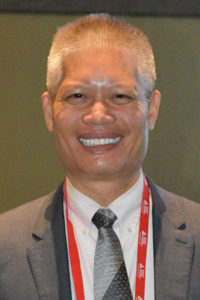
Diabetes is not an equal opportunity disease. The prevalence of diagnosed and undiagnosed diabetes ranges from 17.4% of African Americans to 13.6% of White Non-Hispanic Americans, but the outcomes are far different. Nationwide, Black people with diabetes are 2.2-fold more likely to die than White people. Rural residents have higher diabetes mortality than urban residents, with Black rural and urban mortality dramatically higher than White mortality rates.
“Too much of what we have done in diabetes is patching over problems,” said Joshua J. Joseph, MD, MPH, FAHA, Assistant Professor of Endocrinology, Diabetes and Metabolism, at the Ohio State University Wexner Medical Center. “We need to transform communities so each community has an equal chance at health. There has to be an ongoing commitment to correct the social determinants that matter so much in health.”
Dr. Joseph explored racial discrimination and other social determinants of health during the mini-symposium Diabetes Through a Health Equity Lens on Friday, June 3. The session was livestreamed and can be viewed on-demand by registered meeting attendees at ADA2022.org. If you haven’t registered for the 82nd Scientific Sessions, register today to access the valuable meeting content.
In the 1930s, the Federal Housing Administration and other U.S. agencies began color-coding maps to identify neighborhoods to promote home ownership using mortgage insurance. Neighborhoods outlined in red, based on racial and other social factors, were deemed ineligible for mortgage insurance. Eighty years later, those same redlined neighborhoods are home to a higher prevalence of diabetes, higher mortality, and more years lost to diabetes compared to nearby neighborhoods that were not redlined.
“Redlining explains more than 50% of diabetes mortality and years of life lost today,” Dr. Joseph said. “Living in these neighborhoods affects biologic processes resulting in increased obesity, hypertension, tissue inflammation, type 2 diabetes, earlier age of disease onset, and increased mortality.”
The solution to these disparities begins with addressing nonmedical health-related social needs, standardizing medical processes, improving patient-provider engagement, and implementing anti-racist processes with the same deliberate intent that redlining and other discriminatory tactics were implemented.

Addressing nonmedical social needs is critical to improving diabetes outcomes, Dr. Joseph said. In Ohio, a hub system was created to screen individuals and address social needs. Hub offerings include easy-to-access food banks with affordable produce, shopping and cooking programs, community gardens, community health workers, high-intensity interventions to improve A1C, and much more.
“Ohio Medicaid is at the table, which gives us a direct conduit to identify and solve problems,” Dr. Joseph said. “Medicaid pays providers to address social needs, but that payment is contingent on actually acting, not promising to act.”
The state Medicaid program is also improving access to diabetes medications and technologies. Medicaid is streamlining access to SGLT2 (sodium-glucose cotransporter 2) inhibitors, GLP-1 (glucagon-like peptide-1) receptor agonists, and other high-impact, high-cost medications. Prior authorization for continuous glucose monitors (CGM) will be discontinued in July.
“We are giving out CGMs, not at doctors’ offices, but at parks and recreation centers in the community,” Dr. Joseph said. “We need to break down the four walls of the health care system and work with people where they are.”
The National Institute of Diabetes and Digestive and Kidney Diseases (NIDDK) is moving in similar directions. The agency launched its first health equity and health disparities research implementation effort in 2022, said Pamela L. Thornton, PhD, Senior Advisor for Workforce Diversity and Health Equity, and Program Director at the Centers for Diabetes Translation Research.
Dr. Thornton was unable to attend the Scientific Sessions and submitted short remarks read by symposium moderator Marshall Chin, MD, MPH, the Richard Parrillo Family Professor of Healthcare Ethics and Research Director, Chicago Center for Diabetes Translation Research at the University of Chicago.
“I have been impressed by NIDDK’s efforts in equity research,” Dr. Chin said. “They are forward-thinking and they are addressing issues of structural racism. It’s very possible for one individual to have an impact in care. And there’s power in organizations like NIDDK and the ADA. This is a good time to be working in the equity space.”
[sub-post-content]

